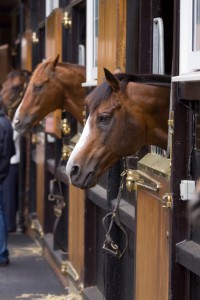Over the winter, bad weather can lead to horses being stabled for long periods of time. You may be unable to turn out at all, and often people are unable to ride. Those of us without the luxuries of horse walkers or indoor schools may have to keep our horses permanently stabled with very little exercise while snow and ice persist. This confinement doesn’t suit horses, who have evolved as wanderers and are much more suited to live out in massive paddocks than in a 12x12 block! Confinement may have negative effects on the physical and mental well-being of our horses, and we often need to adjust how we look after them to ensure that they stay healthy through a period of intensive stabling.
Here we take a look at common problems owners face, and how we can help their horses through their box rest. Q: My horse goes mad if he has to be stabled for more than a day- he becomes very angry and difficult to handle, is there anything I can do to help him when the weather is so bad he has to stay in? A: While some horses are happy living in, for other horses it can be very hard to adjust to 24hr stabling. If your horse is stressed by being confined, they often react by being difficult, angry or bargy. To help to reduce your horse’s stress levels, make sure they always have hay or haylage available, as this keeps them satisfied, and eating gives them something to do! If they are a very good doer, double net small holed haynets to reduce intake! Reduce hard feed, if your horses are fed a chaff, keep feeding this it helps with gut fill and take your horse much longer to eat, and consider using a horse ball and a few nuts to keep your horse occupied. It can help some horses if they can see a friend nearby, and stable mirrors may also help. Try to avoid high sugar licks and treats while your horse is cooped up, and concentrate on slow release energy sources. If your horse is of a nervy disposition, we recommend that you feed our fantastic calmative Steady-Up Advance to your horse while they are stabled, and when first turned out to reduce stress. Q: My horse is prone to hard droppings, and often gets this over the winter- how can I help him if he has to be confined? A: Horses that are on box rest are more prone to digestive disturbances. To help to reduce the risk of these problems, increase your horses hydration by providing them with clean, fresh water at all times (warm water is shown to help increase drinking when the weather is cold!). Give your horse a rock salt lick in their table, and add table salt or electrolytes to their feed to encourage drinking. Feeding soaked hay and soaked feeds will also help your horse to stay hydrated. As mentioned above, reduce hard feed and provide ad-lib hay or haylage to help keep the digestive tract moving. In addition to this it is wise to add BioPro to your horse's feed during and after periods of confinement. This provides your horse with probiotics- the good bacteria needed by the hind gut to digest fibre, and maintain a healthy digestive system, and prebiotics, which are not used by the horse, but feed these good bacteria, helping to maintain the right balance of gut flora in your horse. Q: My horse’s legs swell up when they are stabled, is there anything I can do to help? A: Filled legs are a common problem when movement is restricted, such as when your horse is stabled for longer than normal periods of time. This is due to a collection of fluid, which would ordinarily be pumped around the horse’s body when the horse moved, when the hooves hit the ground. When the horse is unable move around as usual, such as when confined to their stable, this fluid does not get pushed around the body, and the legs become filled. If it is possible, walking the horse (in hand or using a walker) will help to disperse this fluid. However, this is often not an option when the weather is foul. Feeding NoFill to your horse helps to support the lymphatic and circulatory systems and keeps your horse more comfortable. Q: I reduce my horses hard feed when they are unable to be ridden, how do I know that they are getting all the vitamins and minerals that they need? A: If your horse is usually fed the recommended levels of a mix or cube, it is usually recommended that this is reduced over periods when they are not being worked, especially if they are stuck in. In these cases we recommend that over the course of a few days you reduce the hard feed, and introduce a vitamin and mineral supplement to ensure that your horse is getting all the nutrients they need- for poor doers or those that would normally receive a relatively large amount of hard feed, we would recommend our Original Balancer, which provides vitamins and minerals, a probiotic and naturally occurring amino acids to help maintain muscles.












